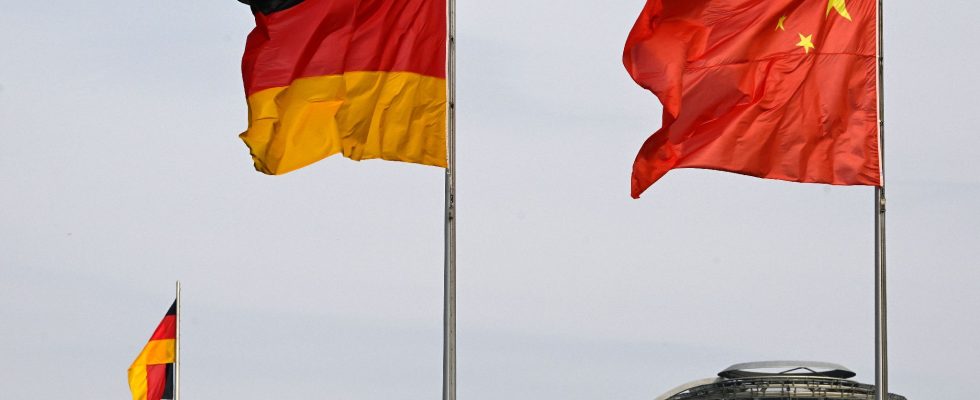Germany confirms a change of strategy towards Beijing. According to a statement from a government official, Wednesday September 20, Berlin plans to strongly limit or ban technologies from Chinese companies Huawei and ZTE from its 5G telephone networks.
If these manufacturers are best known for their smartphones, Germany is rather aiming for their omnipresence in the market for parts manufactured for antennas and 5G relay stations, scattered throughout the country. This technological dependence is considered dangerous for Berlin, which wishes to do without them from 2026. A change of position on the issue which contrasts with the Merkel years.
A two-step plan deemed unrealistic
While Germany found itself dependent on Russian gas with the Nord Stream projects, the country seems to want to avoid seeing its independence called into question again. According to the content of the bill consulted by AFP, the German 5G mobile network is thus seen as “the central nervous system of Germany as an economic power”. Therefore, Berlin assumes in this text that it is necessary to “reduce the risks” in the face of this dependence on Chinese equipment for questions of national security.
Emancipation is planned in several stages. First, Chinese components would be excluded from the “core network” of German operators from January 1, 2026, government sources tell AFP. Important point: these specify that the ban would also concern parts already installed. Afterwards, mentions the British agency Reutersthese operators would be required by October 1, 2016 to reduce by 25% on average the weight of Huawei and ZTE in the components of their 5G access networks, scattered throughout Germany.
A plan that is not unanimous. If Huawei logically criticized the German project, voices were also raised on the operators’ side. The objective of reducing the weight of Chinese equipment manufacturers by 25% is considered unrealistic, reports Reuters, which recalls that “Huawei represents 59% of German 5G networks”, according to a survey by the consulting firm Strand Consult. Faced with this observation, Deutsche Telekom considers that the three-year period which separates them from this objective is far too short, while Telefonica Deutschland plans “to seek damages as well as legal proceedings”, adds the British agency.
New German policy sparks internal debate
This bill is also criticized within the government of Prime Minister Olaf Sholz. Although it is currently supported by the German Ministry of the Interior, this objective of banning Huawei and ZTE from 5G networks must nevertheless be the subject of an agreement within the government coalition. According to the German press, not all ministers have joined in for the moment.
The German Digital Ministry stressed for its part “that there are already very high standards and strict regulations regarding the use of critical components in the development of 5G”. Therefore, an Interior Ministry spokesperson said on Wednesday that the audit of telecommunications systems “is not completed and discussions with other ministries involved in the decision continue.”
Because this announcement marks a new change in Germany’s position vis-à-vis authoritarian powers. After asserting itself in opposition to Russia over the war in Ukraine, Berlin has hardened its position towards China over the past year in reaction to threats targeting Taiwan or accusations of persecution against the Uighurs. This shift was materialized by the publication in mid-July of a strategic document expressing the desire to “reduce critical dependencies” in relation to Beijing.
This threat to ban Huawei and ZTE from 5G networks therefore marks once again a break with the era of ex-Chancellor Angela Merkel, who in 2020 refused the idea of a Chinese boycott because it was considered harmful to business. from the country. Olaf Sholz’s Germany, for its part, seeks to maintain a delicate balance between pursuing economic cooperation with its largest trading partner and protecting its strategic and security interests.
A Europe increasingly critical of China
An internal debate which echoes a broader discussion on the place to be left to Chinese technology giants in the Western market. The idea of banning Huawei and ZTE for cybersecurity issues is not new: as early as 2020, former US President Donald Trump questioned the presence of the two companies, against the backdrop of the trade war with China . A strategy continued by his successor Joe Biden, banning Huawei and ZTE from its 5G network for the first time from November 2022.
Although American accusations of risks of espionage or sabotage of Western networks have never been corroborated, several of Washington’s allies followed this ban. This is the case of Canada, the United Kingdom, Sweden and even France in 2019. But despite American pressure to follow suit, other European countries remain divided on the approach to adopt.
The context of growing concerns in Europe and the United States regarding Beijing’s ambitions, however, seems to tip the scales. In June, the European Commission called on the 27 member countries and telecoms operators to exclude Huawei and ZTE from their mobile networks, also announcing that it would no longer subscribe to mobile phone services based on the companies’ equipment. An increasingly firm opposition, while the European executive continues to see China as “a partner, a competitor and a systemic rival”, as formulated since 2019.
